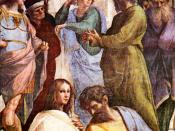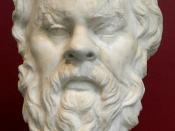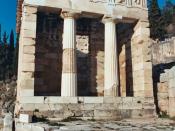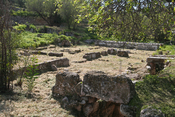Socrates liked to ask people questions to help them challenge what they thought they already knew. He questioned Athenians on subjects they rarely talked about, making them think about something they normally would not. He did his questioning out in the open where Athenians gathered so the public could observe and hopefully think on the subjects he was talking about. Socrates would question respectable Athenians making them look stupid too a crowd, because they would not know what to say. Making the person being questioned very angry towards Socrates for putting them in such a position. The people Socrates questioned were the same people who condemned him to death. Socrates was sentenced to death because people did not like him and they wanted to shut him up for good. There was not any real evidence against Socrates to prove the accusations against him.
Socrates was condemned for questioning ideas that had long been the norm, and some of the Athenian youth copied his style of questioning for fun, making Athenians think Socrates was teaching the youth to be rebellious.
The charge of corrupting the youth is unjust because Socrates did not tell the youth to copy him and he is not responsible for their actions. Socrates was simply stating his ideas to who ever wanted to listen, and he wondered how Meletus could think that by doing this he was corrupting the youth.
"But do you still claim, Meletus, that I am corrupting the young by these practices? Now, we know, of course, what corruptions the young are liable to; so you tell me if you know of anyone who has stopped worshipping the gods because of me, or who has substituted arrogance for humility, or extravagance for economy, or drunkenness for moderate drinking, or flabbiness for exercise, or who has given in to any base indulgence because of me." "No," said Meletus, "but I most certainly know of those whom you have persuaded to listen to you rather than to their parents." (Xenophon, Socrates' Defense, 45)". Meletus, in this statement, acknowledged that Socrates did not corrupt the youth. Meletus was very willing to agree with Socrates' statement. Here, the truth of the charge is brought to question.
Socrates does not appear to hold different religious views than the Athenians who put him death. The difference exists in how he uses these views to justify his position. Instead of accepting the myths and applying a degree of uncertainty he broke them logically to end up with a fairly detailed description of his religious views. The charge of not believing in the gods recognized by the state was completely absurd because Socrates talked about the gods quite frequently. And he addresses how absurd this clam was during his trial.
" You know, gentlemen, the first thing I find puzzling is what evidence Meletus can be using to clam that I do not recognize the gods recognized by the state, for leaving aside all possible eyewitnesses, Meletus himself could, if he had chosen, had seen me sacrificing during the communal festivals and at public alters."ÃÂ (Xenophon, Socrates' Defense, 43)". Perhaps the Oracle at Delphi was the leading incident that threw the jury. The Oracle at Delphi informed Socrates that he was the wisest man. After searching to disprove the oracle at Delphi, Socrates concedes that truly he is the wisest man. People despised this and this could have been a major reason for Socrates' trial. Once again, charges stemmed from hostility of Athenian authorities towards Socrates.
" Once, when Charephon made an inquiry about me in Delphi, Apollo replied, and there were many witnesses, that I was the most free, upright and prudent of all people (Xenophon, Socrates' Defense, 44)".
Socrates goes on to say that Apollo thought Socrates far outshone the rest of mankind and he was considering whether to call him a man or a god. There was uproar from the jury at his speech. Some of them did not believe what he was saying while others were just jealous that the gods might think higher of him then them. Socrates was seventy years old. Why did his prosecutors wait until then to bring up charges if he had always been an atheist and been corrupting the youth for quite some time. The reason was that he had only recently made enemies of groups in charge of prosecuting him and the trail was their revenge for his belittling them. Socrates was like a "fly"ÃÂ that was always buzzing around your ear. But instead of squishing the "fly " they had it drink poison. They found a legal way to murder him.





